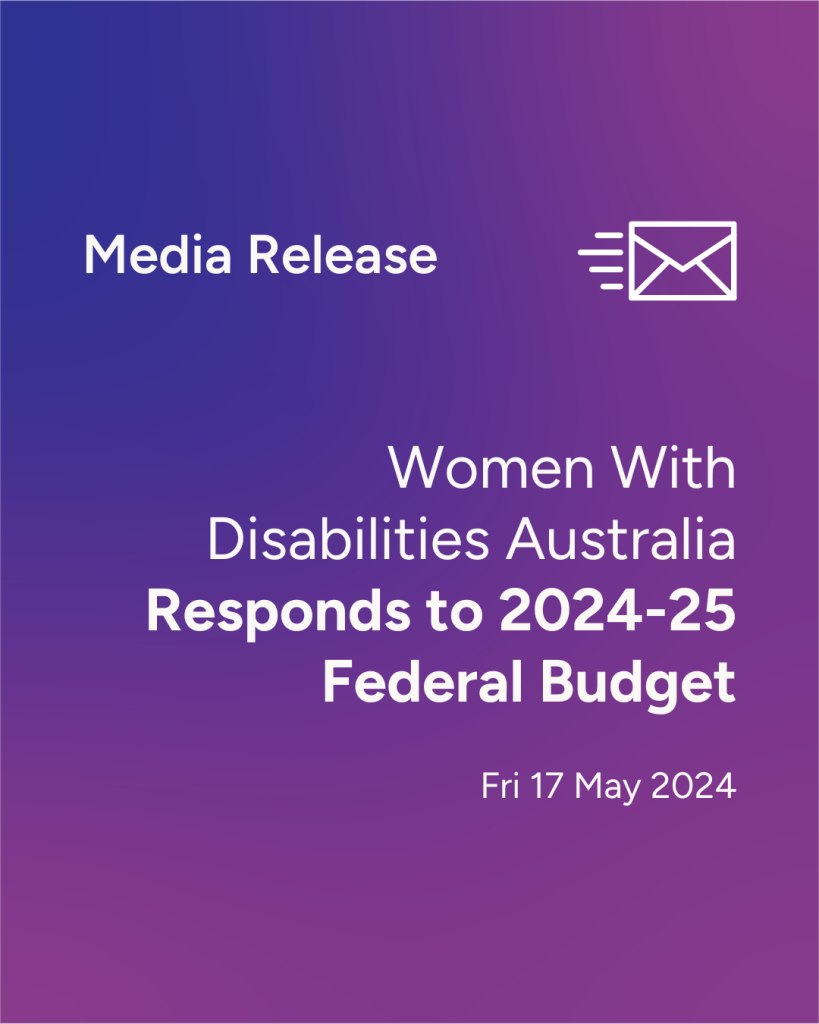17 May 2024, Hobart, TAS
Women With Disabilities Australia (WWDA) acknowledges the 2024-25 Federal Budget but expresses concern over the missed opportunity for targeted action to improve the lives of women with disabilities. While some positive steps have been taken, transformative change is still needed to address the systemic inequalities faced by women, girls, feminine-identifying, and non-binary people with disabilities.
WWDA’s Key Points in response to the 2024-25 Federal Budget:
- Housing and Cost of Living: WWDA welcomes the government’s commitments to address the housing and cost-of-living crises but emphasises the need for targeted measures that ensure safe, affordable, secure, and accessible housing options for people with disabilities.
- NDIS Consultation: WWDA welcomes the commitment to further engagement to improve access to disability services but stresses the importance of having people with disabilities and our representative organisations at the centre. Genuine co-design must include underrepresented groups including women with disabilities, First Nations people with disabilities, culturally and linguistically diverse people with disabilities, and people with intellectual disabilities.
- NDIS Implementation and Advisory Committee: WWDA is hopeful that this committee will centre the voices of people with disabilities in NDIS reforms but awaits further details. It is crucial that people with disabilities and our representative organisations lead this reform.
- National Disability Abuse and Neglect Hotline: WWDA welcomes the investment in extending the hotline, but emphasises the need for accessibility, responsiveness, trauma-informed practices, and additional funding for independent advocacy to support people using the service.
- Lack of Targeted Action for Women and Girls with Disabilities: WWDA is disappointed by the lack of specific measures for women and girls with disabilities, despite the Women’s Budget Statement addressing critical areas like gender-based violence, health, and sexual and reproductive rights.
- Domestic and Family Violence: WWDA calls for disability-inclusive responses to gender-based, domestic and family violence that encompass all forms of abuse, and the specific needs and experiences of women with disabilities.
Statement from Sophie Cusworth, Acting CEO of WWDA:
“WWDA has long advocated for the inclusion of women and girls with disabilities in mainstream efforts to prevent and respond to violence. We’re disappointed that we haven’t yet seen the commitments that we need to end the violence that we experience at higher rates than the rest of the population. We’ll be looking for significant commitments from Government in response to the Disability Royal Commission and look forward to opportunities to work with Government to ensure that the necessary reforms are led by people with disabilities.”
Call to Action:
WWDA urges the government to:
- Identify and engage with women, girls, feminine-identifying, and non-binary people with disabilities as a priority cohort in mainstream commitments.
- Ensure the voices of women, girls, feminine-identifying, and non-binary people with disabilities are at the centre of policy and program changes.
- Develop targeted measures to promote the rights of women and girls with disabilities and address the barriers and discrimination we experience.
About Women with Disabilities Australia (WWDA):
WWDA amplifies the voices of women, girls, feminine-identifying, and non-binary people with disabilities to dismantle systemic barriers. We advocate for human rights, challenge discrimination, and promote policies that enable all women with disabilities to thrive. For more information, visit www.wwda.org.au
Contact: Sophie Cusworth (she/her)
Acting Chief Executive Officer
E: sophiec@wwda.org.au

